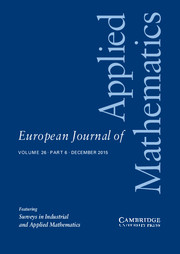Article contents
A nonconservative kinetic framework under the action of an external force field: Theoretical results with application inspired to ecology
Published online by Cambridge University Press: 31 August 2023
Abstract
The present paper deals with the kinetic-theoretic description of the evolution of systems consisting of many particles interacting not only with each other but also with the external world, so that the equation governing their evolution contains an additional term representing such interaction, called the ‘forcing term’. Firstly, the interactions between pairs of particles are both conservative and nonconservative; the latter represents, among others, birth/death rates. The ‘forcing term’ does not express a ‘classical’ force exerted by the external world on the particles, but a more general influence on the effects of mutual interactions of particles, for instance, climate changes, that increase or decrease the different agricultural productions at different times, thus altering the economic relationships between different subsystems, that in turn can be also perturbed by stock market fluctuations, sudden wars, periodic epidemics, and so on. Thus, the interest towards these problems moves the mathematical analysis of the effects of different kinds of forcing terms on solutions to equations governing the collective (that is statistical) behaviour of such nonconservative many-particle systems. In the present paper, we offer a study of the basic mathematical properties of such solutions, along with some numerical simulations to show the effects of forcing terms for a classical prey–predator model in ecology.
Information
- Type
- Papers
- Information
- Copyright
- © The Author(s), 2023. Published by Cambridge University Press
References
- 4
- Cited by


